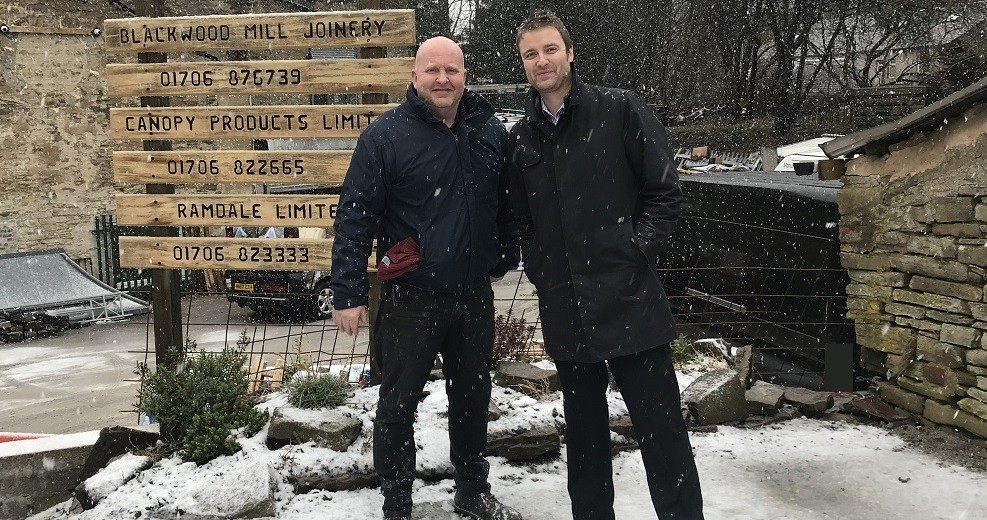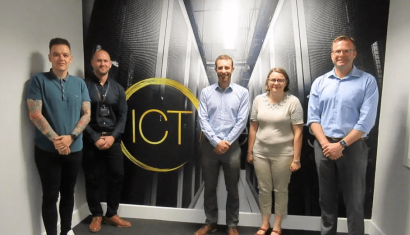
Canopy Products called the University of Central Lancashire’s (UCLan’s) Making Carbon Work (MaCaW) project, an academic/industry collaboration, part funded by the European Regional Development Fund (ERDF). Since 1973, Canopy Products Ltd has been crafting door canopy sets, gallows brackets, heritage barge boards and more from its base in Bacup, Lancashire.
The company supplies its products to a wide range of clients including major construction companies and blue chip clients. For some years the company has been on a sustainability journey – its products are made from sustainably sourced, kiln dried wood, with offcuts used as heating fuel. Stepping up its sustainable operations meant looking at alternative forms of electricity generation. To begin with, the company had considered tapping into the potential of the river that runs by its workshops. Sales Director Paul Taylor contacted UCLan’s MaCaW project to see if such a plan was feasible.
“I was thinking about the potential of some sort of water wheel powering a turbine,” Paul explains, “but when MaCaW arrived to carry out their carbon survey it very quickly became clear that wasn’t going to work. The gradient in the river isn’t sufficient to generate power effectively and, even if it was, we’d have to clear a lot of hurdles In terms of legalities and negotiating with the water company.” But by completing a free carbon assessment, the MaCaW team were able to identify far more achievable ways of cutting energy and carbon.
MaCaW’s assessment started with a review of Canopy Products’ energy billing data followed by a site visit. Paul found the process simple: “They took the legwork out of it, doing lots on our behalf and working out the calculations for us.” The resulting carbon report identified technological and behavioural changes the company could put in place that would together achieve savings of 6.69 tCO2e/annum with a cost saving of almost £3,500 each year. The report recommended new LED lighting to replace the existing inefficient lights and solar photovoltaic panels. Once in place, the report showed they could reduce Canopy Products’ utility costs by 42%. The behavioural changes were the no-cost quick wins. “A lot of it was around switching off the lights and only using electricity when we need to,” says Paul, “so we put signs in place and we are seeing some change, although it's a message that we constantly need to repeat.”
“They took the legwork out of it, doing lots on our behalf and working out the calculations for us.”
Completing the carbon reporting process unlocked matched grant funding, part-financed by the European Regional Development Fund (ERDF). Thanks to the grant, Paul was able to halve the near £15,000 cost of the lighting and solar installation. “We're expecting this to pay for itself in a couple of years,” Paul calculates, “and that's looking at today's figures. As electricity costs are only going one way we expect it to also give us some protection against rising energy costs.”
Just as important as the cost savings is the carbon reduction, as Paul describes: “We are already a sustainable business but we are working to do more. That’s clearly the right thing to do, but it’s also something a growing number of our clients expect. They are companies with responsibilities and commitments to deliver sustainability not just in their own operations but through their supply chains. By taking these steps, we’re able to demonstrate how we’re working to remove carbon from our operations.” The solar panel installation was completed recently. “We haven't yet had a bill,” explains Paul, “but we're expecting to see the benefit next year.
We're submitting the meter readings and building up the credit now.” Would Paul recommend MaCaW to other Lancashire businesses? “Without a doubt. In fact I’ve already recommended them. It was a really good experience. They did everything in their power to make it happen and we're really pleased.” To explore how MaCaW could help make your business more efficient while supporting your carbon reduction activities, contact us.
MaCaW is a University of Central Lancashire (UCLan) project, an industry and academic collaboration funded by the ERDF alongside UCLan, and supported by Boost; Lancashire’s business growth hub.

ICT Reverse looks to greener future with the help of Eco-I North West
Craig Smith
ICT Reverse, Lancaster

Funding support provides power for Lancaster wind turbine innovation
Dominic Chippendale
O-Innovations, Lancaster



The website uses cookies.
Some are used for statistical purposes and others are set up by third party services. By clicking 'Accept all & close', you accept the use of cookies. For more information on how we use and manage cookies, please read our Cookie Policy.